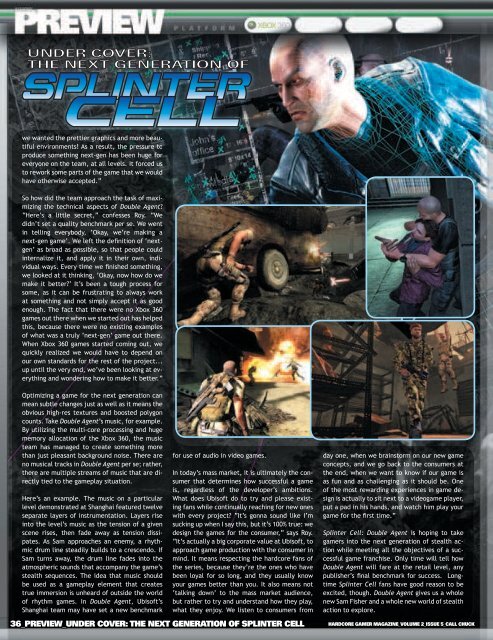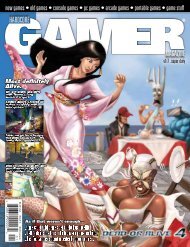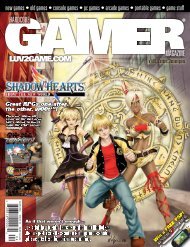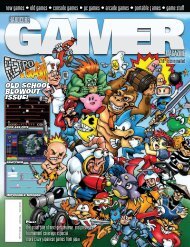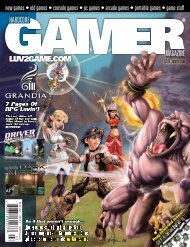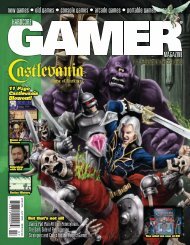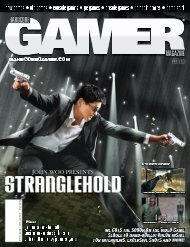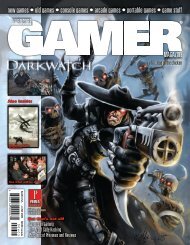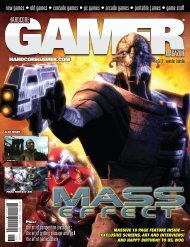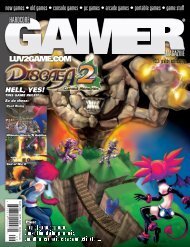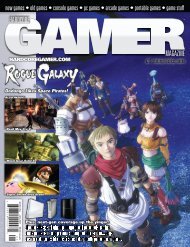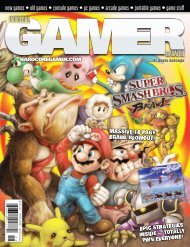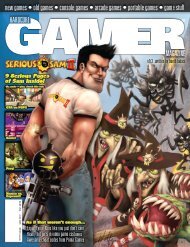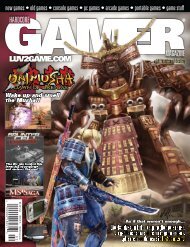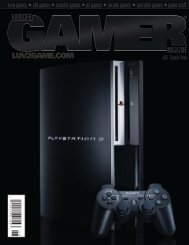Volume 2 Issue 5 November 2006 Grand Theft Auto - Hardcore Gamer
Volume 2 Issue 5 November 2006 Grand Theft Auto - Hardcore Gamer
Volume 2 Issue 5 November 2006 Grand Theft Auto - Hardcore Gamer
Create successful ePaper yourself
Turn your PDF publications into a flip-book with our unique Google optimized e-Paper software.
we wanted the prettier graphics and more beautiful<br />
environments! As a result, the pressure to<br />
produce something next-gen has been huge for<br />
everyone on the team, at all levels. It forced us<br />
to rework some parts of the game that we would<br />
have otherwise accepted.”<br />
So how did the team approach the task of maximizing<br />
the technical aspects of Double Agent?<br />
“Here’s a little secret,” confesses Roy. “We<br />
didn’t set a quality benchmark per se. We went<br />
in telling everybody, ‘Okay, we’re making a<br />
next-gen game’. We left the denition of ‘nextgen’<br />
as broad as possible, so that people could<br />
internalize it, and apply it in their own, individual<br />
ways. Every time we nished something,<br />
we looked at it thinking, ‘Okay, now how do we<br />
make it better?’ It’s been a tough process for<br />
some, as it can be frustrating to always work<br />
at something and not simply accept it as good<br />
enough. The fact that there were no Xbox 360<br />
games out there when we started out has helped<br />
this, because there were no existing examples<br />
of what was a truly ‘next-gen’ game out there.<br />
When Xbox 360 games started coming out, we<br />
quickly realized we would have to depend on<br />
our own standards for the rest of the project...<br />
up until the very end, we’ve been looking at everything<br />
and wondering how to make it better.”<br />
Optimizing a game for the next generation can<br />
mean subtle changes just as well as it means the<br />
obvious high-res textures and boosted polygon<br />
counts. Take Double Agent’s music, for example.<br />
By utilizing the multi-core processing and huge<br />
memory allocation of the Xbox 360, the music<br />
team has managed to create something more<br />
than just pleasant background noise. There are<br />
no musical tracks in Double Agent per se; rather,<br />
there are multiple streams of music that are directly<br />
tied to the gameplay situation.<br />
Here’s an example. The music on a particular<br />
level demonstrated at Shanghai featured twelve<br />
separate layers of instrumentation. Layers rise<br />
into the level’s music as the tension of a given<br />
scene rises, then fade away as tension dissipates.<br />
As Sam approaches an enemy, a rhythmic<br />
drum line steadily builds to a crescendo. If<br />
Sam turns away, the drum line fades into the<br />
atmospheric sounds that accompany the game’s<br />
stealth sequences. The idea that music should<br />
be used as a gameplay element that creates<br />
true immersion is unheard of outside the world<br />
of rhythm games. In Double Agent, Ubisoft’s<br />
Shanghai team may have set a new benchmark<br />
for use of audio in video games.<br />
In today’s mass market, it is ultimately the consumer<br />
that determines how successful a game<br />
is, regardless of the developer’s ambitions.<br />
What does Ubisoft do to try and please existing<br />
fans while continually reaching for new ones<br />
with every project? “It’s gonna sound like I’m<br />
sucking up when I say this, but it’s 100% true: we<br />
design the games for the consumer,” says Roy.<br />
“It’s actually a big corporate value at Ubisoft, to<br />
approach game production with the consumer in<br />
mind. It means respecting the hardcore fans of<br />
the series, because they’re the ones who have<br />
been loyal for so long, and they usually know<br />
your games better than you. It also means not<br />
‘talking down’ to the mass market audience,<br />
but rather to try and understand how they play,<br />
what they enjoy. We listen to consumers from<br />
36_PREVIEW_UNDER COVER: THE NEXT GENERATION OF SPLINTER CELL<br />
day one, when we brainstorm on our new game<br />
concepts, and we go back to the consumers at<br />
the end, when we want to know if our game is<br />
as fun and as challenging as it should be. One<br />
of the most rewarding experiences in game design<br />
is actually to sit next to a videogame player,<br />
put a pad in his hands, and watch him play your<br />
game for the rst time.”<br />
Splinter Cell: Double Agent is hoping to take<br />
gamers into the next generation of stealth action<br />
while meeting all the objectives of a successful<br />
game franchise. Only time will tell how<br />
Double Agent will fare at the retail level, any<br />
publisher’s nal benchmark for success. Longtime<br />
Splinter Cell fans have good reason to be<br />
excited, though. Double Agent gives us a whole<br />
new Sam Fisher and a whole new world of stealth<br />
action to explore.<br />
HARDCORE GAMER MAGAZINE_VOLUME 2_ISSUE 5_CALL CHUCK<br />
<br />
®


